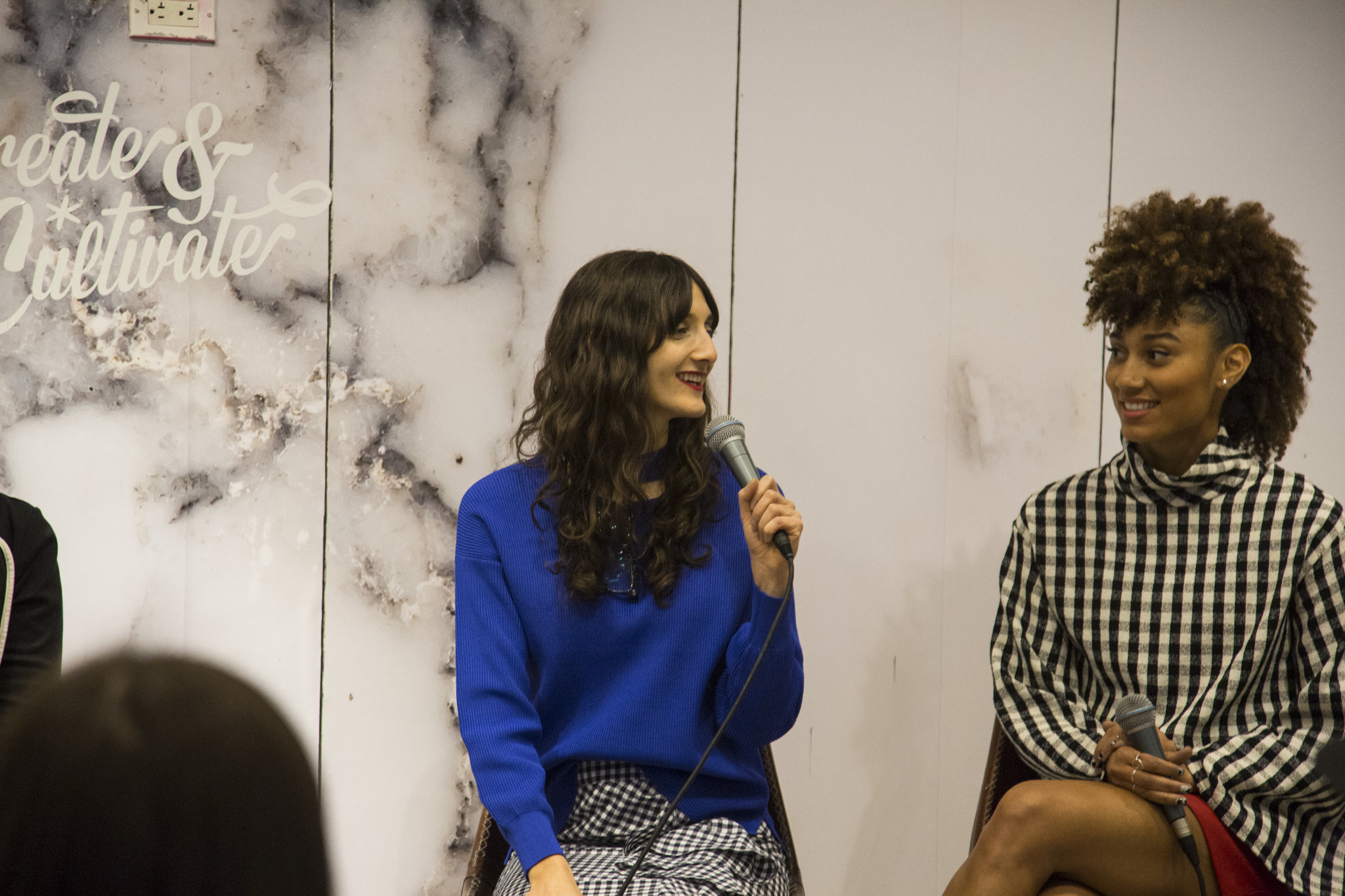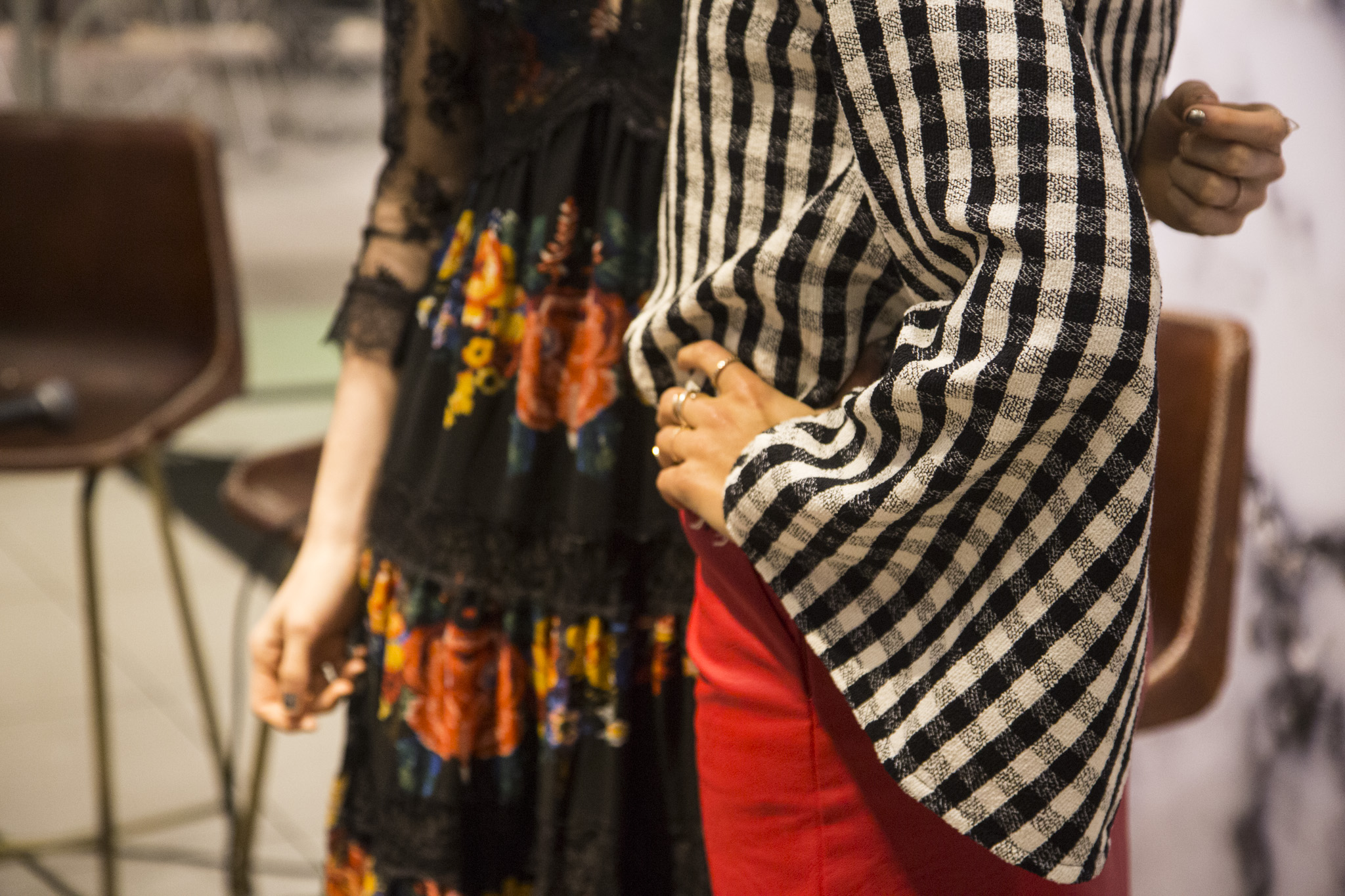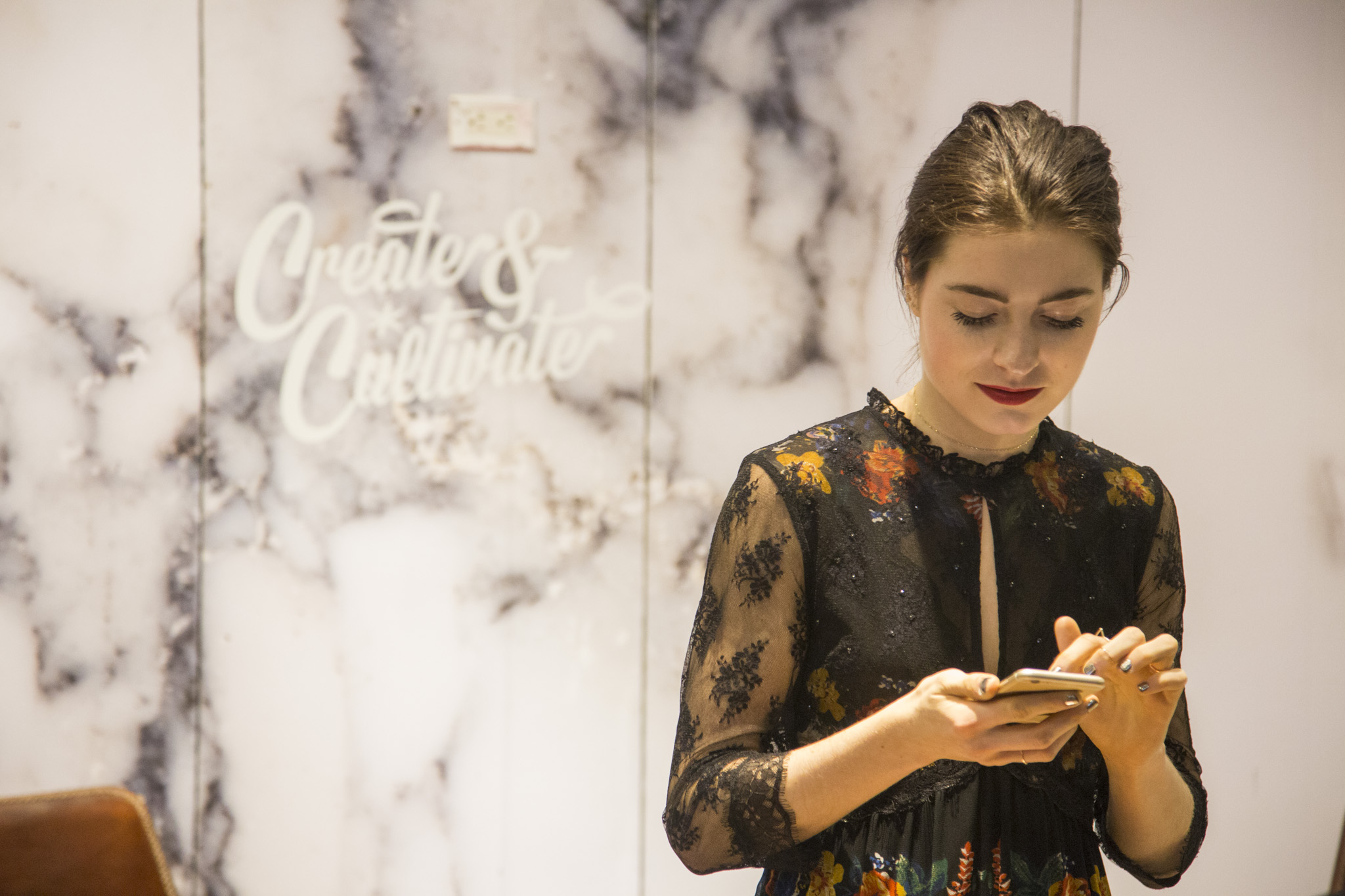There's a Better Way to Say "No" to People
It’s important to create boundaries out of respect for yourself, your time, and your energy—we truly can’t do it all.
Photo credit: Smith House Photography
You have three outstanding assignments sitting on your desk, your phone is lighting up with texts from your friend reminding you that you’re scheduled to have a check-in call, and then your boss Slacks you to ask if you can work late to help out on seven other tasks that need finishing.
Before you can stop yourself, “Uh, sure! I mean, of course,” tumbles out of your mouth. You know full well that you're unable to handle another thing, but there’s just something about saying “no” that’s almost impossible to do. Here’s how to say “no” in a way that’s beneficial to you and your boss.
Have “No” Fear?
If the above situation sounds familiar, it's not surprising—many of us are afraid to say no. Psychology Today offers two main reasons why: We fear conflict and we don’t like to disappoint others. Because of this, we often say yes even if taking on something else isn’t in our best interest. We want to make others feel better—but we sacrifice our own feelings and time in return.
For many, saying no can feel... harsh. But learning to turn down a request is a crucial skill to master. It’s important to create boundaries out of respect for yourself, your time, and your energy—we truly can’t do it all.
So, how do we get better at saying “no?” The answer involves swapping that word for something else entirely. Let us introduce you to your new magic words: “I don’t.”
The Power of “I Don’t”
When we're skittish around the word “no,” we often try to decline requests with an “I can’t”—but “I don’t” is actually the best phrase to use. The reason is this: “I can’t” implies that you want to do something but an external factor is stopping you from doing it. It suggests you could do that task—and it leaves room for people to push back. For example: Saying “I can’t go to the party tonight” leaves lots of room for someone to respond with a “Why not?”
“Saying ‘I don’t’ turns a rejection into an affirmation of how you live your life.”
“I don’t,” on the other hand, reclaims your authority over your actions. When you say that you don’t do something, it's an iron-clad refusal—you as a human don’t do what's being asked of you, and you don’t do it for your own sake. “I don’t go to parties on weeknights” is much more impactful than “I can’t go tonight.” The phrase turns a rejection into an affirmation of how you live your life, making it powerful and something you own.
Another example: If you have a coworker asking you to step in on the office party planning committee—but you already have the responsibility of organizing the company’s retreat plus 10 outstanding work assignments—you can reply with a simple, “Although I wish I could help further, I don’t take on other projects when I’m behind on my existing assignments.” That statement is a lot harder to argue with than, “I can’t do that right now,” and it’s more thoughtful than a plain “no.”
How to Use “I Don’t” to Motivate Yourself
“I don’t” is also a powerful tool you can use when working towards your goals. If you incorporate it into your self-talk, it can increase your willpower.
When researchers at Boston College and The University of Houston conducted a small study looking into the use of “I don’t” and “I can’t,” they found that participants who said “I don’t skip exercise” rather than “I can’t skip exercise” ended up working out more often than the “I can’t” group. “Using the word ‘don’t’ serves as a self-affirmation of one’s personal willpower and control ... leading to a favorable influence on feelings of empowerment, as well as on actual behavior," the researchers wrote.
Take Control of “No”
Bottom line: “I don’t” puts the ball back in your court. It gives you authority over your no and leads to a powerful but respectful decline—or, an empowering motivational phrase.
It’s a lesson in framing, and it’s an easy way to turn dreaded “no”s into something empowering. Give it a try next time you need to say no but feel yourself about to say yes.
Article by Anna Meyer. There's a Better Way to Say “No” originally appeared on Shine, a free daily text to help you thrive.
About Shine: Shine is a free daily text message experience that makes it easier to live a more intentional life. Each weekday morning, Shine sends curated content and actionable tips across confidence, daily happiness, mental health and productivity. Why? Because we all need a little help to get through the day—and Shine’s got your back. To sign up, text “SHINE” to 759-85 or go to www.shinetext.com to learn more.
Follow Shine on Instagram, Twitter & Facebook: @ShineText
This post was originally published on December 26, 2017, and has since been updated.
MORE FROM OUR BLOG
How to Make New Year's Resolutions That Last
Don’t be so hard on yourself.
In the day or two after New Year’s Eve, you likely process a mix of feelings: euphoria and hope for a new year, resolve to change those ‘bad habits’ that held you back last year -- and often, a fresh perspective on who you are and where you see yourself going.
You probably set some goals. But not your friendly neighborhood diner type of goals. No, you set Michelin-star, creme-brulee-boasting, so-fancy-they-serve-the-salad-with-the-baby-fork restaurant type of goals.
You want to work on that six pack every day of the week, write a bestselling novel, give up being the ‘always late’ coworker, save 80% of the money you're making and call that long-distance friend every day to check in.
We all set lofty goals for ourselves with each new year. Our ambition is one of the many things that makes us so amazing as humans. There’s just one part of the whole New Year’s resolutions formula that tends to go awry: Our goals often aren’t sustainable.
Change is hard overnight, and when we set unrealistic, binary milestones for ourselves and subsequently struggle to reach them in a short timeframe, we crash and burn. In fact, USA Today reported that by mid-February, eighty percent of resolutions fail. The good news? There’s an antidote that is 100% within our control: setting goals with self-compassion.
In it’s simplest terms, self-compassion means being kind to ourselves when we feel inadequate or slip up. It's been proven to lead to greater emotional wellbeing and is linked to less depression, anxiety and stress. Psychologist and researcher Dr. Kristen Neff defines self-compassion in three abilities: self-kindness, common humanity and mindfulness. Here’s how you can use self-compassion when making your resolutions:
Self-kindness
...is about flipping the script and reserving judgement on ourselves (studies have shown that we are three times more likely to feel compassion for a total stranger).
If we are struggling to meet a goal, there are probably valid reasons. Recognize that you’re going to do the best you can, and when you have off days—empathize with where you’re coming from.
Common humanity
...is about realizing that we all are imperfect beings.
Recognizing that you’re not alone and that you will doubtlessly hit roadblocks along the way, can empower you to rely on community and support for others in moments of self-criticism. There is a 100% chance that someone else has felt exactly the way you do, whether you’re crushing it or struggling.
“Self-compassion helps bridge the gap between who we feel we are and who we really are.”
Mindfulness
...is about cultivating an awareness. We can’t be kind to ourselves or rely on the power in shared humanity if we don’t recognize when we’re being particularly hard ourselves.
As Dr. Anna Rowley, psychologist and millennial wellbeing expert, says, “We can separate ourselves from our negative thinking or feelings of inadequacy. Your boss chews you out for a report she doesn’t like. You have a choice—dwell on what a failure you are or practice mindfulness and acknowledge the feedback and do better next time. By separating ourselves from the emotion—anger, frustration, or self pity—we are available to problem solve.”
Did you know? We are 3 times more likely to feel compassion for a total stranger than for ourselves.
Unfortunately there is a common misconception, that being compassionate with ourselves means that we’re going to take it easy, give ourselves a pass to never improve or become set in our ways. But the reality is that when we focus on empathizing with ourselves and meeting ourselves where we are, we can set goals that build on our strengths and realistically help us improve.
“Self-compassion helps bridge the gap between who we feel we are and who we really are,” says Dr. Rowley. “Resolutions are hard to change because we are trying to alter aspects of ourself we aren’t happy with or behaviors we may have ‘lived’ for a long, long time. Many of us set unrealistic or unreasonable goals.
For example, ‘I will go to the gym 4 times this week’ might be a tough resolution to keep if you have never been to a gym before or you are embarrassed walking into a room full of strangers grunting and heaving. Self-compassion is about reducing the risk of feeling like a failure if you don’t nail your immediate goal.
It also helps us set more realistic compassionate goals. Rather than join a gym, I’ll go for a walk or next time I shop, I’ll look for a healthier choice of foods. Self-compassion can help us make smarter choices and offer a helping hand when we mess up…and we will mess up.”
So this year, as you continue to grow, evolve and work on yourself, remember to set goals that allow you to be kind to yourself, too.
Written by: Marah Lidey, co-founder Shine
Sign up for Shine to set an intention and track your goals for the year.
The original version of this article appeared on Shine.
MORE FROM THE BLOG
The Big Lie Killing Your Confidence
Self-doubt is a prickly old thing.
photo credit: Raymond Tan
Written by Maxie McCoy for Shine
There's this really amazing skill in life called maximizing your strengths and playing to them whenever possible. Not only does it put you in a position to be more successful, but it also it keeps you feeling energized when you're working within your talents.
From work, to interpersonal relationships, to creative hobbies, playing to your strengths is a great tactic for success.
On the flip side, however, dismissing your weaknesses can hold you back.
How many times have you ever muttered the words, “I’m just not good at that.” Whether it was spreadsheets, entrepreneurship, painting, surfing, or public speaking, assuming that you’re not good at something and therefore staying away from it is a recipe for dissatisfaction.
Believing that your talents, skills, and competencies are static is a huge lie you’re telling yourself.
According to renowned Stanford Psychology Professor Caroline Dweck, the most successful people in life believe that everything develops and grows. They have a growth mindset which is shown to directly correlate to confidence as challenges are met with optimism in order to improve.
Believing that your talents, skills, and competencies are static is a huge lie you’re telling yourself.
You simply need to rewire your brain to believe that you can absolutely get better at whatever you put your mind and energy toward. Getting into action on new skills helps build self-efficacy and creates new opportunities for you across the board.
To harness a growth-mindset and improve your confidence start here:
Identify where you feel your skills are innate or predetermined
Where are you staying on the sidelines of your life? What things do you feel drawn towards but have convinced yourself that you’re just not good at?
Identifying these competencies is the first step in creating an action plan to improve them. Try listing out all the things you’ve ever assumed that you’re not good at. Circle the one or two you wish you were better at. And voila, you have a skill worth putting your energy toward.
Measure effort and improvement
No one wakes up as the best gymnast in the world. Nor do they become an amazing public speaker just by breathing. Anyone who is great at something has dedicated time and energy towards it.
Everything about you can and will get better with effort. If you track and measure where you started and how you progress, you’ll be fueled with more encouragement to keep going when you see the positive outcomes.
Know It’s Always a Stretch and Act Anyways
Anyone who does something that they don’t feel strong at feels the discomfort of a stretch. The greats? They do it anyways. They level up. The feel the stretch and keep going for it.
"Anyone who is great at something has dedicated time and energy towards it."
Tweet this.
Having a growth-mindset keeps you moving toward that stretch instead of away from it. Stretching is key to knowing that eventually you’ll be able to reach the new level you so desire.
Remember these four tips whenever you find yourself “convinced” that you’re bad at something. Harnessing a growth mindset will remind you that you’re not bad, you’re just inexperienced and being hard on yourself.
If there's something you really want to experience, master, or create... don't let a few shoddy attempts discourage you. Because you're not static. You're not stagnant. You're not still. You're not bad at it. You're just not far enough in to have gotten good. Fiercely believe that you can, and you will.
An original version of this appeared on Shine.
Sign up for more advice to help you improve your confidence.
MORE FROM OUR BLOG
Why 80% of New Year's Resolutions Fail by Mid-February
And what you can do about it.
photo credit: Elle Magazine
Written by: Marah Lidey, co-founder Shine
In the day or two after New Year’s Eve, you likely process a mix of feelings: euphoria and hope for a new year, resolve to change those ‘bad habits’ that held you back last year -- and often, a fresh perspective on who you are and where you see yourself going.
You probably set some goals. But not your friendly neighborhood diner type of goals. No, you set Michelin-star, creme-brulee-boasting, so-fancy-they-serve-the-salad-with-the-baby-fork restaurant type of goals.
You want to work on that six pack every day of the week, write a bestselling novel, give up being the ‘always late’ coworker, save 80% of the money you're making and call that long-distance friend everyday to check in.
We all set lofty goal for ourselves with each new year. Our ambition is one of the many things that makes us so amazing as humans.
There’s just one part of the whole New Year’s resolutions formula that tends to go awry. Our goals often aren’t sustainable.
Change is hard overnight, and when we set unrealistic, binary milestones for ourselves and subsequently struggle to reach them in a short timeframe, we crash and burn.
In fact, USA Today reported that by mid-February, eighty percent of resolutions fail.
The good news? There’s an antidote that is 100% within our control: setting goals with self-compassion.
In it’s simplest terms, self-compassion means being kind to ourselves when we feel inadequate or slip up. It's been proven to lead to greater emotional wellbeing and is linked to less depression, anxiety and stress.
Psychologist and researcher, Dr. Kristen Neff, defines self-compassion in three abilities: self-kindness, common humanity and mindfulness.
Self-kindness
...is about flipping the script and reserving judgement on ourselves (studies have shown that we are 3 times more likely to feel compassion for a total stranger).
If we are struggling to meet a goal, there are probably valid reasons. Recognize that you’re going to do the best you can, and when you have off days - empathize with where you’re coming from.
Common humanity
...is about realizing that we all are imperfect beings.
Recognizing that you’re not alone and that you will doubtlessly hit roadblocks along the way, can empower you to rely on community and support for others in moments of self-criticism. There is a 100% chance that someone else has felt exactly the way you do, whether you’re crushing it or struggling.
“Self compassion helps bridge the gap between who we feel we are and who we really are.”
Mindfulness
...is about cultivating an awareness. We can’t be kind to ourselves or rely on the power in shared humanity if we don’t recognize when we’re being particularly hard ourselves.
As Dr. Anna Rowley, Psychologist and millenniall wellbeing expert says, “we can separate ourselves from our negative thinking or feelings of inadequacy. Your boss chews you out for a report she doesn’t like. You have a choice - dwell on what a failure you are or practice mindfulness and acknowledge the feedback and do better next time. By separating ourselves from the emotion - anger, frustration, or self pity - we are available to problem solve.”
Did you know? We are 3 times more likely to feel compassion for a total stranger than for ourselves.
Unfortunately there is a common misconception, that being compassionate with ourselves means that we’re going to take it easy, give ourselves a pass to never improve or become set in our ways.
But the reality is, that when we focus on empathizing with ourselves and meeting ourselves where we are - we can set goals that build on our strengths and realistically help us improve.
“Self compassion helps bridge the gap between who we feel we are and who we really are,” says Dr. Rowley.
She continues:
“Resolutions are hard to change because we are trying to alter aspects of ourself we aren’t happy with or behaviors we may have ‘lived’ for a long, long time. Many of us set unrealistic or unreasonable goals.
For example, "I will go to the gym 4 times this week”might be a tough resolution to keep if you have never been to a gym before or you are embarrassed walking into a room full of strangers grunting and heaving. Self compassion is about reducing the risk of feeling like a failure if you don’t nail your immediate goal.
It also helps us set more realistic compassionate goals. Rather than join a gym I’ll go for a walk or next time I shop I’ll look for a more healthy choice of foods. Self-compassion can help us make smarter choices and offer a helping hand when we mess up - and we will mess up.”
So, this year as you continue to grow, evolve and work on yourself - remember to set goals that allow you to be kind to yourself.
Sign up for Shine to set an intention and track your goals for the year.
The original version of this article appeared on Shine.
MORE FROM OUR BLOG
What You Missed: Work + Wellness Panel at Topshop
There may have been a baby blizzard outside, but our Work + Wellness pop-up at Topshop in Soho was still packed with panelists, audience members, knowledge, and some fab outfits thanks to Topshop Personal Shopper.
We took it to the audience at times-- asking who felt burnt out, who had cried in the last week, and despite decreased visibility outside, inside the store it was very clear: we all felt the same way-- a little burnt out by the 24/7 nature of work and life, the tech tear, and that no one can do it alone.
Here are six of our favorite takeaways from last night.
START YOUR DAY OFF RIGHT
But know that means different things to different people.
“When I first started working, I was so eager to impress my boss,” shared Colleen Wormsley of Shine. “The sun would go down, I would still be working, and I missed being outside. So in the morning I made the conscious decision to walk. To take the subway farther away, so I could have that 15 minutes in the morning to clear my head. To start my morning that way.”
Nicole Loher, who works a full time job, trains for triathlons and is a wellness influencer, says that she is constantly taking small steps to get it right, but echoes the idea that ‘right’ and ‘well’ are subjective— a word that host, model, and dancer Ally Love brought up.
Case in point: the morning of our panel Nicole woke up at 4am to train with her swim coach. “Every day is a work in progress for everyone,” she shared.
IT IS POSSIBLE TO FULL TIME/ PART TIME & BE HAPPY
Ally Love, who is a part of the “slash generation,” works best when busy. But doing five jobs and attempting to give her one hundred percent to all of them, was proving too challenging. Doing everything for the multi-talented woman meant she had to realize she wasn't going to do it “all” alone. “If you’re going through divorce, you go to a really good lawyer because you want it to end well. If there’s something wrong with you, you go to a good doctor because you want to live. The same thing goes for your career," she explained. "If you want things to go well, outsource to really great people.”
“I had to ask for help,” she told the audience. “I created a team knowing I had to trust other people who knew what my end goals are and how to leverage opportunities.”
“Burn out is real,” shared Nicole, piggybacking on that idea. “Don’t be afraid to ask for help.” “Find what you love to do in your full time job and try to make sure that your full time and part time job can merge,” explained the wellness influencer who in her full time job likewise manages influencers in the wellness space.
Or know what you do best. “I made the part time, the full time,” said Jessy Fofana of La Rue PR. Speaking of:
KNOW YOURSELF
Keeping up with the web and social is a struggle for everyone— from the most seasoned influencers, to those who appear to have their content game on lock, to the women on panel.
“You have creativity," said Ally, "but creativity comes in different ways. I get creative when I get exhausted. That’s when I find new effective ways to grow. So know your energy type. I need to get depleted to sit down and have a great idea.”
"Your success level is not established by how active you are, but how productive you are."
Tweet this.
“I need to use a lot of my unnecessary energy to tap into the power within in,” Love told the crowd delving in a little deeper. “Other people have that direct connection. Your success level is not established by how active you are, but how productive you are. Trust that inside of you.”
BE CONSCIOUS
“For people who are working weekends and nights and feel like there is an expectation that they put in a lot of time— there probably is that,” said Rebecca Willa Davis, Deputy Editor for Well + Good. “But I also think that even in our downtime we are taxing our systems. We’re watching Netflix while we’re on our phones, while we’re eating dinner, while our friend is sitting next to us,” she said. “We're not fully embracing our downtime."
Rebecca understands that the content game is 24/7. “When you send out a newsletter seven days a week, there’s no way to get around that.” But she qualified, “There are ways to make sure that free time feels like downtime, so when I am working, I’ve had some relief.”
It other words: unplug, get outside, and pay attention to the friend sitting next to you.
“Think about how your non-work time will benefit your future work time,” added Colleen. “Some of my best ideas that I never would have thought of happened because I turned off, went and saw a friend and had a conversation.”
AND ALSO BE A CONSCIOUS BOSS
Rebecca shared that she typically sets aside nights and weekends to get emails out, but even though that schedule works for her, it wasn’t the healthiest for her team.
“When I was sending out these emails late at night or on the weekends, the people on my team felt like they had to be on at all times because their boss was on at all times.” Adding, “I think of work and wellness as not only wellness for myself, but wellness for my team.”
So what did she do? She downloaded an add-on that schedules when her emails send. “It’s so simple,” she explained, “but allows me to work within the schedule that works best for me, without imposing on other people.”
ON AT ALL TIMES?
Do we need to turn up or turn off?
Millennial burnout is real. Nicole shared that a few years ago she was working for a company she was so passionate about, but spread too thin. “It was a taxing, emotional rollercoaster,” she said. She was crying every day, working 15 hour days, and she was only 23. “I wasn’t able to focus on myself, get in my workouts, or even see my friends and family.” She left that job, without anything lined up, and then wrote about it openly on the internet. She credits this as her own “personal point of becoming well again and moving on.”
"When you let go of something good, you’re only making way for something great.”
Tweet this.
“It took a lot to admit to myself that I was burnt out. It was a really scary moment to quit my job. But I think 2017 is a great year for millennials and the slash generation because you don’t have to be one thing anymore. When you let go of something good, you’re only making way for something great.”
MORE FROM OUR BLOG
5 Hacks For the Over-Committed
How to be the most-productive busy bee.
If there’s one way to describe my schedule, it’s over-committed. My friends, family, and interviewers all know it as my biggest weakness. I have trouble saying no, which has resulted in some great opportunities... and also some not so great experiences.
If you’re anything like me, you know it’s easy to overcommit, but extremely difficult to balance such a full schedule.
Though I haven’t quite learned how to say no yet, I have learned how to manage all of my responsibilities, which can be summarized in 5 tips below:
1. Commit to causes you actually like.
At the moment, I have five jobs. Yes, five. This wasn’t unplanned, nor do I work 100 hour weeks. I absolutely love each job and have been learning completely different skills at each one. Though having one, full-time job is more customary, it’s just not for me. I enjoy exploring different areas and learning more about myself through things that I am passionate about. Curt Rosengren summarizes the benefits of loving your work, citing increased energy and confidence as benefits of being passionate about your job.
2. Be transparent about busyness.
A heavy workload can work - if you are upfront with friends, family, and people you work with.
By letting others know you have a lot on your plate, you can best allocate the time you do have to work on a specific task. Those around you will be able to understand the type of efficiency you work with, and you will be able to be more productive during the time you allot for each task.
3. Don’t allow other commitments to be distractions.
It is very tempting to work on several things at the same time. Your day at job #1 could be going a little slow, so you pull up a project you have been working on for job #2. Not a good idea.
A heavy workload can work - if you are upfront with friends, family, and people you work with.
This distraction puts you at a lower focus for job #1, and your coworkers can start to view you as a slacker. Whenever doing any type of work, focus 100% on that task. The work you produce will be higher quality and result in higher satisfaction from others.
4. Quality always trumps quantity.
The only thing worse than having 143 things to do is having someone on your team who is always late or missing deadlines. If your involvement is starting to take a toll on the quality of your work or your commitment to a team, take a step back.
It is always better to be delivering your best self to a project or task, rather than a flustered and busy you. Those around you will notice when there is too much on your plate. Maintain the self awareness to know when it’s too much.
5. Organization, serious organization.
When you have multiple deadlines or several places to be, it can be difficult to remember where you’re supposed to be or what you’re supposed to be doing.
Help your busy self out and put events and deadlines on a calendar (and set alerts!), make to do lists, and schedule things like grocery shopping, seeing friends, and going to the gym. You may have a lot of commitments, but there’s no reason to sacrifice your quality of life. Planning and being organized will allow you to maintain productivity while also avoiding copious amounts of stress.
The over-committed life is not for everyone. Having a lot of responsibilities is often stressful and can leave little you-time. If you’re luckier than I am, you’ve probably figured out how to successfully say no.
If you’re in the same boat as me, take a deep breath and remember that having so many responsibilities is a blessing that most don’t have, and people like us might just be taking advantage of this wonderful world that we live in.
This piece by Kelsey Bishop originally appeared on Shine Text.
MORE ON THE BLOG
Need a Break Babe? We Got You Covered with a Creative Getaway
Creative getaway in wine country? SIGN. US. UP.
Source: Cheetah is the New Black
It's nearing the end of 2016, which brings feelings of both elation (!!!) and exhaustion (zzz). You worked hard, you played hard, and now, you deserve the chance to recharge your creative brain.
And since we're #strongertogether we teamed up with the ladies of Brit + Co, Shine Text, Levo League, and our favorite inspiring redhead Maxie McCoy to bring you a $2000 Creative Getaway to shoo away any feelings of burnout.
ONE LUCKY WINNER WILL RECEIVE:
ROUNDTRIP AIRFARE
2-NIGHT HOTEL STAY in OJAI, CA
VIP PRIZE PACKAGE OF GIFTS VALUED AT OVER $900
2 BRIT + CO ONLINE CLASSES
On this trip you will reset in the beautiful wine country of Ojai, CA. The prize package is stocked full of goodies to help you live that good life. And the classes ready and waiting to help you slay 2017.
So what are you waiting for? CLICK HERE to enter our Creative Giveaway with Maxie, Levo League, Shine Text and Brit + Co + keep reading to learn more about our partners!
Maxie McCoy
If you've come to our conferences, then you are definitely familiar with our good friend Maxie. She is a boss extraordinaire, and is one of the most inspiring women you'll ever meet. Follow her site for the best work/life advice and success strategies to make you the best entrepreneur that you can be!
Brit + Co
For all the things DIY, lifestyle, beauty, home, and even classes to help build up your skill set as a boss, Brit + Co. has it all for you on their site. Brit + Co. is ready to offer you all the advice and tips to live your best life.
Levo League
Maybe you're not much of a morning person but still want to start your day off on the right foot? Shine Text can help give you that extra boost of confidence to slay your day. Sign up for their texts to get their daily affirmations sent right to your phone!
NO PURCHASE NECESSARY TO ENTER OR WIN. Must be a U.S. resident and be age 18 or over to enter. Submitting your email address also means you’ll be subscribing to the Create & Cultivate newsletter (if you haven’t already) and the Levo League, Maxie, Brit + Co and Shine newsletters. Entries will be accepted online starting at 12AM PST on 11/17/16 and ending at 12AM PST on 12/6/16. Full official rules HERE.






























